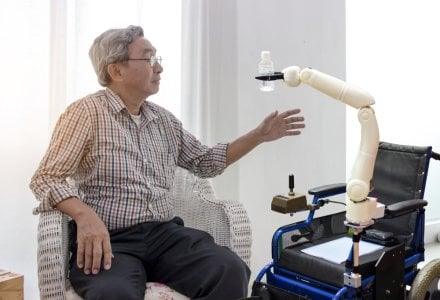Tech Talk with Dr Al: Artificial Intelligence – Do We Need It?
- Replies 9
Note from the Editor:
This article was kindly written for the SDC by member Alan G, ‘The Tech Guy’.
What is AI?
Having read many science-fiction stories when I was in my teens, I thought I was quite familiar with Artificial Intelligence. I understood it to mean the ability of a man-made machine to appear to have the intelligence of a human being. Isaac Asimov wrote many stories about robots – some ‘good’ robots, some ‘bad’, but he created the impression that it was a foregone conclusion that there would be an increasing role for robots in our technology revolution. Asimov took the idea of humanised robots to the point where robots had to obey several ‘laws’ to prevent there being any conflicts, but one might suggest that ‘robots’ only do what their programming tells them and to do more than that, they would have to be some sort of pseudo-human with the power to reason.
On the other hand, this very power is taught to us from a very early age. We’ve all been ‘programmed’ in a way and can make a choice based on that programming – or ‘brain-washing’.
As seniors, we generally need more help. If left on their own, some people suffer from loneliness, and most of us will need help around the home in many ways. As our mobility is gradually reduced, normal daily activities become increasingly more problematic. In addition to this, medication is often required on a regular basis simply to keep us alive and to maintain a satisfactory quality of life. Simply remembering one’s health regime becomes more difficult as short-term memory deteriorates.
‘Home-help’ Robots:
Home help (Silver Chain, etc.) can call several days a week, but if we had a ‘home-help robot’ that was around 24/7, we should be far better off, and it could be far less costly to our strained medical system.
AI ‘robots’ are able to assist older adults in the performance of their daily activities, such as raising an alarm in the event of a fall – an alert could be sent to the family or medical facility - management of medication, and helping them to move around their home if they become less mobile. This help makes it possible for them to live independently for longer. Where ‘AI’ differs from a programmed assistant is in the ability of the robot to detect changes in behaviour that may result from incorrectly administered medication, in the same way a human might say: ‘Yes, he/she is behaving rather strangely!’
‘Companion’ Robots:
Loneliness is a significant issue for older adults, according to recent studies, and this is found to have an adverse effect on mental health, such as depression and cognitive impairment.
From the relative simplicity of an Echo Dot or Alexa device, AI technology is being used in the development of actual robot companions. An Alexa unit, for instance, can respond to questions in an ever-increasing number of subjects as well as turn the TV or lights on. This social interaction is vital in the prevention of social isolation of the elderly and in the promotion of mental well-being. A social robot can offer near-human companionship and provide much-needed emotional support, not to mention mental stimulation. It can improve quality of life by its ability to play games and even engage in conversations. Of course, the physical appearance of any ‘companion’ robot is very important for its acceptance by the elderly person involved. Studies have been carried out using small animal robots and positive outcomes were recorded among seniors with dementia.
Wearable Devices:
Most of us are aware of ‘Smart Watches’ (you can find my article on Smart Watches here) being worn by an ever-increasing number of people – both young and old. More recently, AI-driven wearable devices are able to monitor vital signs and activity levels, promoting a healthier and more independent lifestyle and the technology has the potential to revolutionise health monitoring for older adults. The analysis of information from a wearable device, together with electronic health records and other sources, allows AI to provide real-time data analysis, detect early warning signs of diseases, and provide personalised treatment plans and recommendations. There is a huge potential for improvement of health care in remote areas – even ‘virtual consultations’ can result from the plethora of medical information gained in this way.
Conclusions and Concerns:
There is no doubt in my mind that the technology revolution is virtually unstoppable. As I type this, I am fully aware of the ephemeral life of the lowly keyboard. We already have the ability to simply dictate to the computer and see it print our words accurately. (I have used a program called ‘Lily-Speak’ – it’s free and VERY good!) Alexa devices and Echo Dot etc., will quickly be replaced by much more sophisticated AI devices and we’ll probably get used to home-help robots with whom we will have spirited conversations, and it won’t just be for seniors! The problem with all of this is, of course, privacy. We have already heard that Alexa actually listens to private conversations, and there is concern about our identities being compromised in this way. We can only hope that the new technology comes neatly parcelled with rock-solid security. Otherwise, we’ll have to get used to the time-consuming rigmarole of new driving licences, Medicare cards, and so on every time some awful little oik decides he wants to pinch our details.
About the author: Having spent three years living in Australia in his youth, Alan returned to Australia in 1969 with his wife and young child. Holding a Bachelor of Engineering degree and a Doctor of Science Education degree, Alan has experience in flight simulations, Einsteinian physics, and inventing an ‘eye blink’ device that allows cerebral palsy patients to communicate. He even took a turn at acting, starring in a TV advert and landing supporting and lead roles in his local dramatic society plays. His short stories have been published in WA’s The Gingin Buzz for ten years, and his novel The Magic Hourglass is a work in progress. He and his wife have a lovely life in Brisbane and regularly visit their two children in Sydney’s West. You can read Alan’s full-length bio here.
From the Editor:
I’d love to hear your thoughts on AI, members.
We were only able to create this content because of the financial support of SDC Rewards members. If you'd like to see more of this (and a lot fewer ads!), please consider supporting us and signing up for SDC Rewards today—it starts at just $5.99 per month.
This article was kindly written for the SDC by member Alan G, ‘The Tech Guy’.
What is AI?
Having read many science-fiction stories when I was in my teens, I thought I was quite familiar with Artificial Intelligence. I understood it to mean the ability of a man-made machine to appear to have the intelligence of a human being. Isaac Asimov wrote many stories about robots – some ‘good’ robots, some ‘bad’, but he created the impression that it was a foregone conclusion that there would be an increasing role for robots in our technology revolution. Asimov took the idea of humanised robots to the point where robots had to obey several ‘laws’ to prevent there being any conflicts, but one might suggest that ‘robots’ only do what their programming tells them and to do more than that, they would have to be some sort of pseudo-human with the power to reason.
On the other hand, this very power is taught to us from a very early age. We’ve all been ‘programmed’ in a way and can make a choice based on that programming – or ‘brain-washing’.
As seniors, we generally need more help. If left on their own, some people suffer from loneliness, and most of us will need help around the home in many ways. As our mobility is gradually reduced, normal daily activities become increasingly more problematic. In addition to this, medication is often required on a regular basis simply to keep us alive and to maintain a satisfactory quality of life. Simply remembering one’s health regime becomes more difficult as short-term memory deteriorates.
‘Home-help’ Robots:
Home help (Silver Chain, etc.) can call several days a week, but if we had a ‘home-help robot’ that was around 24/7, we should be far better off, and it could be far less costly to our strained medical system.
AI ‘robots’ are able to assist older adults in the performance of their daily activities, such as raising an alarm in the event of a fall – an alert could be sent to the family or medical facility - management of medication, and helping them to move around their home if they become less mobile. This help makes it possible for them to live independently for longer. Where ‘AI’ differs from a programmed assistant is in the ability of the robot to detect changes in behaviour that may result from incorrectly administered medication, in the same way a human might say: ‘Yes, he/she is behaving rather strangely!’
‘Companion’ Robots:
Loneliness is a significant issue for older adults, according to recent studies, and this is found to have an adverse effect on mental health, such as depression and cognitive impairment.
From the relative simplicity of an Echo Dot or Alexa device, AI technology is being used in the development of actual robot companions. An Alexa unit, for instance, can respond to questions in an ever-increasing number of subjects as well as turn the TV or lights on. This social interaction is vital in the prevention of social isolation of the elderly and in the promotion of mental well-being. A social robot can offer near-human companionship and provide much-needed emotional support, not to mention mental stimulation. It can improve quality of life by its ability to play games and even engage in conversations. Of course, the physical appearance of any ‘companion’ robot is very important for its acceptance by the elderly person involved. Studies have been carried out using small animal robots and positive outcomes were recorded among seniors with dementia.
Wearable Devices:
Most of us are aware of ‘Smart Watches’ (you can find my article on Smart Watches here) being worn by an ever-increasing number of people – both young and old. More recently, AI-driven wearable devices are able to monitor vital signs and activity levels, promoting a healthier and more independent lifestyle and the technology has the potential to revolutionise health monitoring for older adults. The analysis of information from a wearable device, together with electronic health records and other sources, allows AI to provide real-time data analysis, detect early warning signs of diseases, and provide personalised treatment plans and recommendations. There is a huge potential for improvement of health care in remote areas – even ‘virtual consultations’ can result from the plethora of medical information gained in this way.
Conclusions and Concerns:
There is no doubt in my mind that the technology revolution is virtually unstoppable. As I type this, I am fully aware of the ephemeral life of the lowly keyboard. We already have the ability to simply dictate to the computer and see it print our words accurately. (I have used a program called ‘Lily-Speak’ – it’s free and VERY good!) Alexa devices and Echo Dot etc., will quickly be replaced by much more sophisticated AI devices and we’ll probably get used to home-help robots with whom we will have spirited conversations, and it won’t just be for seniors! The problem with all of this is, of course, privacy. We have already heard that Alexa actually listens to private conversations, and there is concern about our identities being compromised in this way. We can only hope that the new technology comes neatly parcelled with rock-solid security. Otherwise, we’ll have to get used to the time-consuming rigmarole of new driving licences, Medicare cards, and so on every time some awful little oik decides he wants to pinch our details.
About the author: Having spent three years living in Australia in his youth, Alan returned to Australia in 1969 with his wife and young child. Holding a Bachelor of Engineering degree and a Doctor of Science Education degree, Alan has experience in flight simulations, Einsteinian physics, and inventing an ‘eye blink’ device that allows cerebral palsy patients to communicate. He even took a turn at acting, starring in a TV advert and landing supporting and lead roles in his local dramatic society plays. His short stories have been published in WA’s The Gingin Buzz for ten years, and his novel The Magic Hourglass is a work in progress. He and his wife have a lovely life in Brisbane and regularly visit their two children in Sydney’s West. You can read Alan’s full-length bio here.
From the Editor:
I’d love to hear your thoughts on AI, members.
We were only able to create this content because of the financial support of SDC Rewards members. If you'd like to see more of this (and a lot fewer ads!), please consider supporting us and signing up for SDC Rewards today—it starts at just $5.99 per month.









